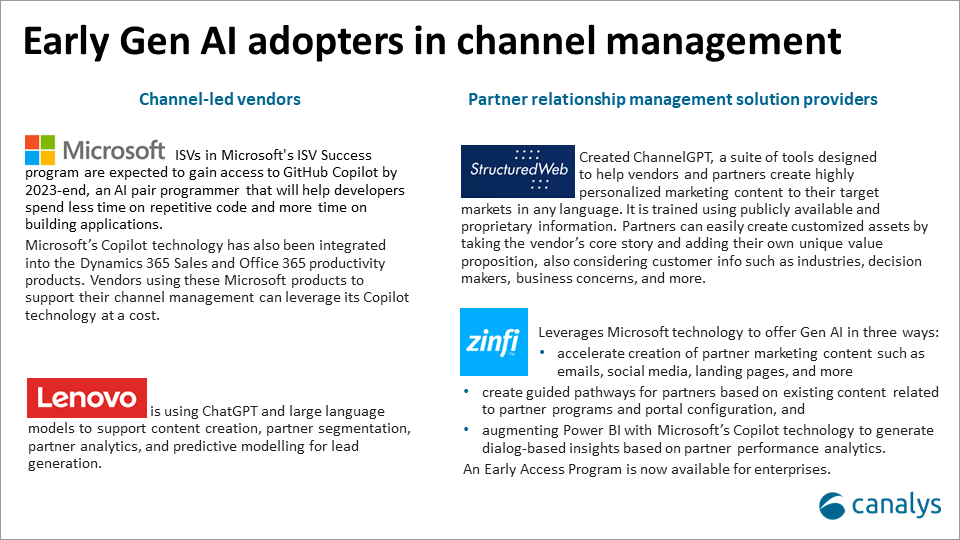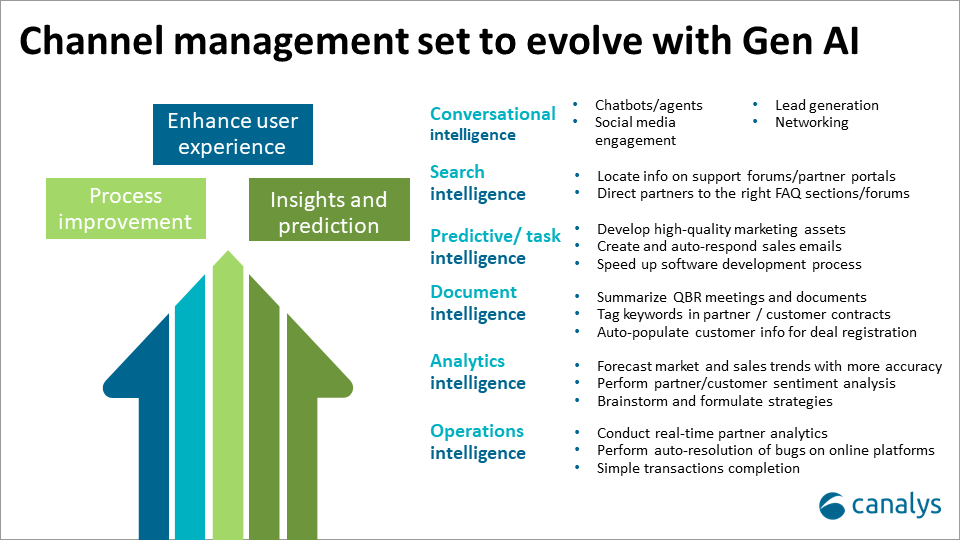Empowering channel management with Gen AI
20 September 2023
Canalys is part of Informa PLC
This site is operated by a business or businesses owned by Informa PLC and all copyright resides with them. Informa PLC’s registered office is 5 Howick Place, London SW1P 1WG. Registered in England and Wales. Number 8860726.
Technology vendors are exploring Generative AI to improve partner experiences, and many partners agree it can help improve efficiency and productivity, having experimented with the technology themselves. While partners see Gen AI’s strongest relevance for them in marketing and sales, they are not always sure how vendors can, or should, implement these technologies with them as end-users. More widespread enterprise-level adoption still depends on overcoming concerns such as cost and data protection compliance. In addition, the broader range of concerns channel-led vendors have, such as how to bring their network of partners onboard, how existing partnering processes should be modified, and the need to be mindful of implications when asking for changes from partners, also sees them being more cautious. Nonetheless, vendors’ interest in Gen AI is emerging as they increasingly look to digital for help to manage their expanding channel coverage, portfolio of products and customer reach. Key questions vendors should ask are where and how can the technology further support them in supporting partners if employees in both vendor and partner organizations are already using Gen AI on their own? And where can returns outweigh costs for everybody?

The decision of a vendor to apply Gen AI at an organizational or departmental level for channel management is influenced by a variety of factors including availability of products, API readiness, and implementation costs. The promise of Gen AI is attractive, if it allows the average employee to complete work in less time with more accuracy, and make mundane or complex tasks, such as data entry or learning, easier. Furthermore, it is often layered onto current workflows and processes rather than creating new ones, making user adoption relatively simple. But if it is to be used to manage third-party partner information, vendors must meet stricter data protection standards, requiring higher accuracy, better compliance, and specific capabilities such as offering answers using only approved data sources (customer history and company policies for example), and tracing answers back to source documents. Until Gen AI becomes a standard among channel management tools, chances are a vendor will have to choose from customized options, which grant vendors specific uses, but they also need a higher ROI to justify the implementation costs and timeline, especially with the complexity involved and a scarcity of AI talents.
Vendors are starting to internalize Gen AI and its benefits, but those experimenting with it should not be overly ambitious. They need to first narrow down existing processes where Gen AI implementation makes sense, identify business constraints, and determine the extent Gen AI will support growth. Success KPIs will differ based on the use-case, such as sales acceleration, number of validated services/products, new customers, and so on.
Gen AI can benefit vendors in terms of faster time-to-market, improved channel insights and better partner segmentation while expanding customer reach. Creativity, and ongoing content output quality monitoring, will also be key in extracting the most value when implemented across various partner roles in marketing, sales, technical and others. Ensuring confidential or sensitive data remains safe is also critical. As more products and/or processes become embedded with AI/Gen AI, new inventions or new ways of working are expected.
Areas where Gen AI will help vendors most in channel management include:

As with most technologies, Gen AI has the power to augment existing processes, and replace certain jobs. Grey areas surrounding Gen AI also have implications for partners, such as existing laws disallowing AI-generated content to be copyrighted. Would customer recommendations using AI algorithms be based on what is best for the customer or the bottom line of a vendor/partner? Would renewal deals closed or influenced by an AI mean lower sales commission for partner sales? What happens if a dispute arises from inaccurate recommendations or resolutions? The blackbox of AI algorithms can be a double-edged sword, particularly for sales and financial matters. Unintentional incorporation of unconscious social bias into marketing materials is also a common concern. More validation of data output accuracy can certainly be useful, and training among users to avoid unintentionally sharing confidential or sensitive information is critical.
Nonetheless, Gen AI is a promising technology for supporting vendors’ channel management and may even be the long-awaited solution to vendors’ longstanding channel complaints. It can improve partners’ experiences, save time and costs, make it easier for partners to do business with vendors and allow partners to place greater focus on acquiring new customers. While Gen AI adoption among vendors is still in its earliest stages and needs to start carefully, those that reject adopting Gen AI entirely risk becoming obsolete as their partners achieve declining returns. Channel-led vendors regularly collecting volumes of quality partner data through their global partner programs are better poised to customize the models they need. As more Gen AI-infused channel management tools become available in the market, vendors could adopt these third-party products supporting partners’ journeys. We know for sure the age of AI has arrived. Expect more vendors to begin embracing Gen AI for channel management to preserve leadership dominance or gain a competitive advantage.